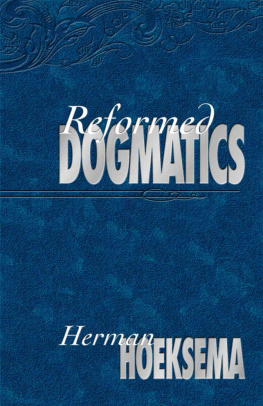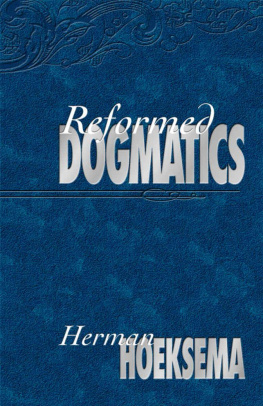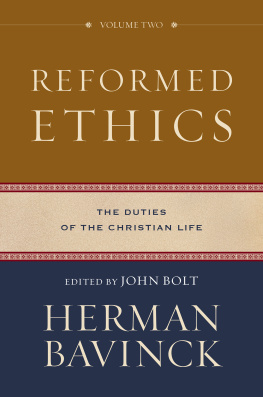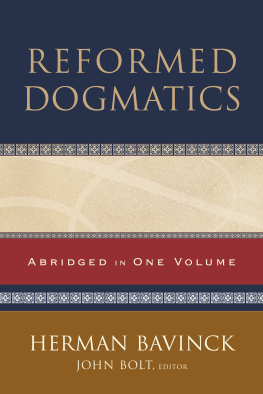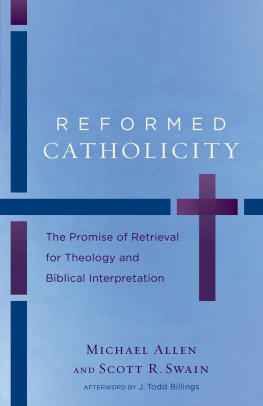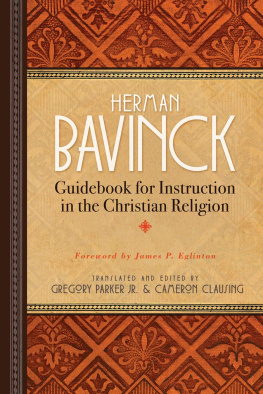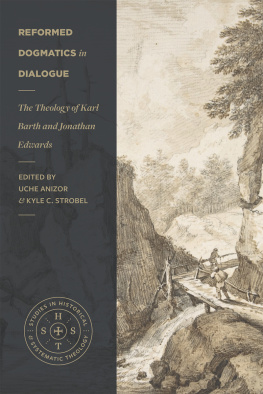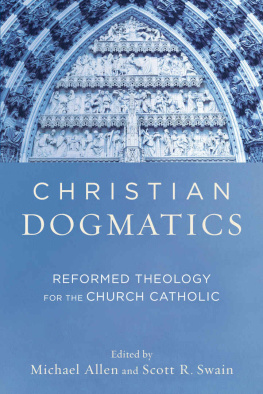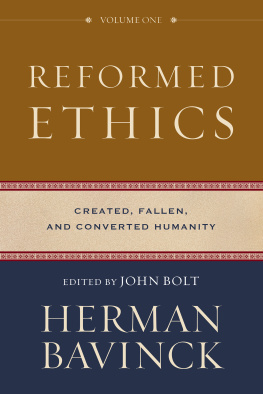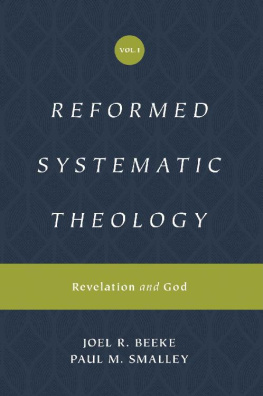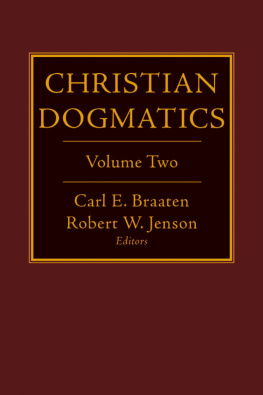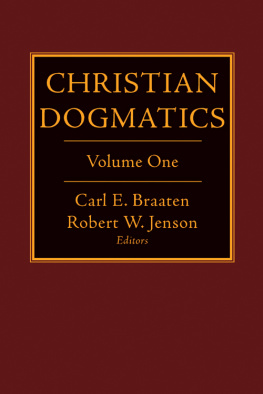Herman Hoeksema - Reformed Dogmatics (Volume 2)
Here you can read online Herman Hoeksema - Reformed Dogmatics (Volume 2) full text of the book (entire story) in english for free. Download pdf and epub, get meaning, cover and reviews about this ebook. year: 0, genre: Religion. Description of the work, (preface) as well as reviews are available. Best literature library LitArk.com created for fans of good reading and offers a wide selection of genres:
Romance novel
Science fiction
Adventure
Detective
Science
History
Home and family
Prose
Art
Politics
Computer
Non-fiction
Religion
Business
Children
Humor
Choose a favorite category and find really read worthwhile books. Enjoy immersion in the world of imagination, feel the emotions of the characters or learn something new for yourself, make an fascinating discovery.
- Book:Reformed Dogmatics (Volume 2)
- Author:
- Genre:
- Year:0
- Rating:3 / 5
- Favourites:Add to favourites
- Your mark:
- 60
- 1
- 2
- 3
- 4
- 5
Reformed Dogmatics (Volume 2): summary, description and annotation
We offer to read an annotation, description, summary or preface (depends on what the author of the book "Reformed Dogmatics (Volume 2)" wrote himself). If you haven't found the necessary information about the book — write in the comments, we will try to find it.
Reformed Dogmatics (Volume 2) — read online for free the complete book (whole text) full work
Below is the text of the book, divided by pages. System saving the place of the last page read, allows you to conveniently read the book "Reformed Dogmatics (Volume 2)" online for free, without having to search again every time where you left off. Put a bookmark, and you can go to the page where you finished reading at any time.
Font size:
Interval:
Bookmark:

2005 Reformed Free Publishing Association
All rights reserved
Printed in the United States of America
No part of this publication may be reproduced, stored in a retrieval system, or transmitted in any form or by any meanselectronic, mechanical, photocopying, recording, or otherwisewithout the prior written permission of the publisher. The only exception is brief quotations in printed reviews
Unless otherwise specified, Bible quotations are taken from the Authorized (King James) Version
First edition 1966 Reformed Free Publishing Association
Second printing of first edition, January 1973
Third printing of first edition, January 1976
Fourth printing of first edition, December 1985
Cover design by Jeff Steenholdt
Reformed Free Publishing Association
1894 Georgetown Center Drive
Jenison, Michigan 49428
www.rfpa.org
ISBN 0-916206-77-7
Ebook ISBN 978-1-936054-79-4
LCCN 22005901834
Contents
Footnote Abbreviations
| ANF | The Ante-Nicene Fathers. Edited by Alexander Roberts and James Donaldson. 10 vols. American reprint of the Edinburgh edition. Revised and arranged by A. Cleveland Coxe. Edinburgh: T & T Clark. Reprinted, Grand Rapids: Eerdmans, 19861989. |
| NPNF | A Select Library of Nicene and Post-Nicene Fathers of the Christian Church. Edited by Philip Schaff. 1 st series. 14 vols. American reprint of the Edinburgh edition. Edinburgh: T & T Clark. Reprinted, Grand Rapids: Eerdmans, 19791989. |
| NPNF | A Select Library of Nicene and Post-Nicene Fathers of the Christian Church. Edited by Philip Schaff and Henry Wace. 2 nd series. 14 vols. Grand Rapids: Eerdmans, 1986. |
| CC | The Creeds of Christendom with History and Critical Notes. Edited by Philip Schaff. Revised by David S. Schaff. 3 vols. 6 th edition. New York: Harper and Row, 1931. Reprinted, Grand Rapids: Baker, 1983. |
| RCSC | Reformed Confessions of the Sixteenth Century. Edited by Arthur C. Cochrane. Louisville: Westminster John Knox Press, 2003. |
THE FOURTH LOCUS
Soteriology
Chapter 23
Introduction: Approaches to Soteriology
Soteriology is the locus of dogmatics that treats the work of God through Christ whereby he realizes his covenant in the hearts of the elect by making them partakers of all the benefits of that covenant as Jesus Christ our Lord has merited them. It is necessary to emphasize from the outset that soteriology is theology and must be theologically conceived. It is necessary to emphasize this over against all forms of Pelagianism, semi-Pelagianism, synergism, and Arminianism.
Pelagianism
Pelagianism really has no room for any doctrine of grace and salvation. It denies the necessity of grace and of the Holy Spirit as the author of salvation. It holds that the will of man is free, the essence of this freedom being his capability of choosing either for the good or for the evil. The guilt of Adam cannot be and is not imputed to the human race, nor is the human nature corrupted by the sin of our first father. There is no original guilt and original corruption or pollution. Man is still capable by nature of obeying the law and of entering into eternal life by so doing. Grace is not necessary unto life eternal. As far as Pelagius speaks of grace, it is merely to facilitate mans obeying the law. It is evident that in this system there is no room at all for soteriology.
Semi-Pelagianism
Especially Augustine emphasized predestination and the total depravity of the natural man and, therefore, the complete dependence of the sinner on sovereign grace. But these truths of absolute and unconditional predestination and of the total depravity of the natural man and of his inability to work anything towards his own salvation soon met with opposition. Although many still adhered to the Augustinian view, semi-Pelagianism arose within the churchwitness the opposition to and the condemnation of Gottschalk in the ninth century. Most of the scholastics, such as Thomas Aquinas and Anselm, maintained the Augustinian conception of predestination. Thomas Aquinas emphasized that predestination is not conditioned by anything in man:
It is impossible that the total effect of predestination should in any degree be caused from our side; because whatever is in man disposing him to salvation is altogether comprehended under the effect of predestination, including even the preparation itself for grace.Others departed from the Augustianian conception of predestination.
Alexander of Hales evidently was disposed to deny the unconditional character of predestination:
Predestination expresses not alone the will of God, but the will together with the foreknowledge that they [the elect] will make a good use of his gift. He occupies the same attitude toward all, but not all occupy the same attitude toward him; and accordingly predestination is not of all, because predestination is conditioned upon the foreknowledge that he [who is its object] will make a good use through free will of divine gifts.The same may be said of Bonaventura and Duns Scotus. In fact, after the death of Duns Scotus there was a widespread defection from the Augustinian doctrine, according to the English theologian Bradwardine, who said, Almost the whole world had fallen into the errors of Pelagianism.
Romanism
The Romish Church, although apparently condemning semi-Pelagianism, in reality fundamentally agrees with it. First, it places the church between the sinner and God, as the author of salvation, and teaches that regeneration takes place through baptism. Further, in regard to those who are not baptized in infancy, Rome teaches a gratia sufficiens ( sufficient grace ), which consists in the illumination of the mind and a strengthening of the will by the Holy Spirit. Man is able either to reject or to accept this grace. Should man reject this grace, he receives gratia adjuvans or cooperans ( assisting or cooperating grace ) and thus cooperates to prepare himself for the gratia infusa ( infused grace ), which in the Roman Catholic mind is the same as the grace of justification:
The Synod furthermore declares, that, in adults, the beginning of the said Justification is to be derived from the prevenient grace of God [ praeveniente gratia summendum esse], through Jesus Christ, that is to say, from his vocation, whereby, without any merits existing on their parts, they are called; that so they, who by sins were alienated from God, may be disposed through his quickening and assisting grace, to convert themselves to their own justification, by freely assenting to and co-operating with that said grace [ eidem gratiae libere assentiendo et cooperando ]: in such sort that, while God touches the heart of man by the illumination of the Holy Ghost, neither is man himself utterly inactive while he receives that inspiration, forasmuch as he is also able to reject it.Lutheranism
The Lutherans generally are synergistic. Luther at first adhered to the truth of absolute predestination and personally never repudiated it completely, although he weakened in his later life because he was afraid of the abuse that might be made of this doctrine. But Melanchthon, under whose influence Luther stood, and who had a strong effect upon the development of Lutheranism, would have nothing of this truth. He believed in the possibility of salvation for all and taught that the will of man cooperates with the Holy Spirit in the work of salvation.
It is true that in the Formula of Concord a certain form of predestination is taught; but that this predestination is absolutely sovereign and unconditional is certainly not maintained:
Next pageFont size:
Interval:
Bookmark:
Similar books «Reformed Dogmatics (Volume 2)»
Look at similar books to Reformed Dogmatics (Volume 2). We have selected literature similar in name and meaning in the hope of providing readers with more options to find new, interesting, not yet read works.
Discussion, reviews of the book Reformed Dogmatics (Volume 2) and just readers' own opinions. Leave your comments, write what you think about the work, its meaning or the main characters. Specify what exactly you liked and what you didn't like, and why you think so.

